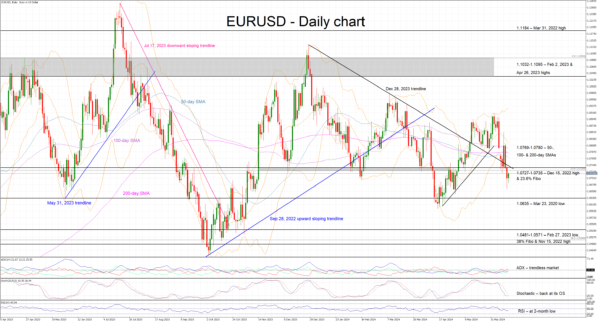- Market ponders the Fed’s stance after a hawkish gathering
- Retail sales to reveal the strength of domestic demand
- Dollar on the front foot; could suffer if data weaken this week
- The May retail sales report will be released on Tuesday 12:30 GMT
At last week’s Fed meeting, consumer spending featured briefly in Chairman Powell’s press conference. The focus was firmly on the May inflation report and the Fed’s dot plot. Even though Powell tried to reduce the importance of the latter, the Fed members’ median expectation of one rate move in 2024 monopolized the market’s interest.
Fed hawks could become more aggressive this week
With the blackout period over, Fed speakers are expected to be on the wires on a daily basis and it will be interesting if the hawks adopt a more aggressive rhetoric. The market is currently assigning a 72% probability of a 25bps rate cut in September with two rate moves expected by year-end. However, the market’s favorite hawk, Minneapolis Fed President Kashkari, has already commented that “it’s reasonable that a rate cut could come in December”.
Data to determine the Fed’s action plan
However, as Chairman Powell highlighted at the press conference, the data will determine if the Fed cuts rates in September or postpones its decision for December. With the Atlanta Fed GDPNow growth estimate for the second quarter of 2024 rising to 3.1%, Fed doves have a mountain to climb in order to convince the rest of the Committee of the need for a rate cut at this juncture.
Retail sales data will be published report on Tuesday
The first piece of the puzzle following the June 12 Fed meeting comes on Tuesday when the May retail sales report will be published. Domestic demand remains the key difference between the USA and the remaining developed countries, and especially Japan where the BoJ is anxiously trying to boost domestic inflation.
The ongoing slowdown in inflation and the consistent increases in earnings have been supporting domestic demand, although a good part of consumer spending has been funded by credit card borrowing, which stood at $1,115 trillion in the first quarter of 2024 and is expected to continue climbing.
Headline retail sales are forecast to record a monthly 0.2% jump, with the retail sales indicator that excludes autos also expected to record a positive monthly print. Interestingly, the retail control group index, which focuses on retail and food stores, is seen rising by 0.4% and thus reversing April’s correction.
As made evident by these forecasts, the market is expecting positive figures, which are unlikely to be welcomed by the doves. However, there is a good possibility of a downside surprise when considering the latest prints from both the Consumer Confidence and the University of Michigan consumer sentiment indices.
Dollar holds most of its recent strong gains
The US dollar has been benefiting from both the heightened political risks in the euro area and the hawkish Fed meeting. As a result, the euro/dollar pair dropped aggressively to its lowest level since late April. With the Fed still pondering its next move, the dollar’s outlook remains somewhat positive even though the ECB is not expected to follow a normal monetary policy easing cycle.
Any indication of a slowdown in consumer spending could result in a gradual unwind of the dollar’s recent gains as the market is anxiously looking for weak economic data prints. A move towards the key 1.0769-1.0780 range could quickly really raise questions about the euro/dollar’s negative short-term outlook.
On the flip side, another strong report is unlikely to massively benefit the dollar with the focus being mostly on the likely US stock market’s reaction. In this case, euro/dollar could try to test the 1.0635 level with profit taking potentially limiting the bearish move.










